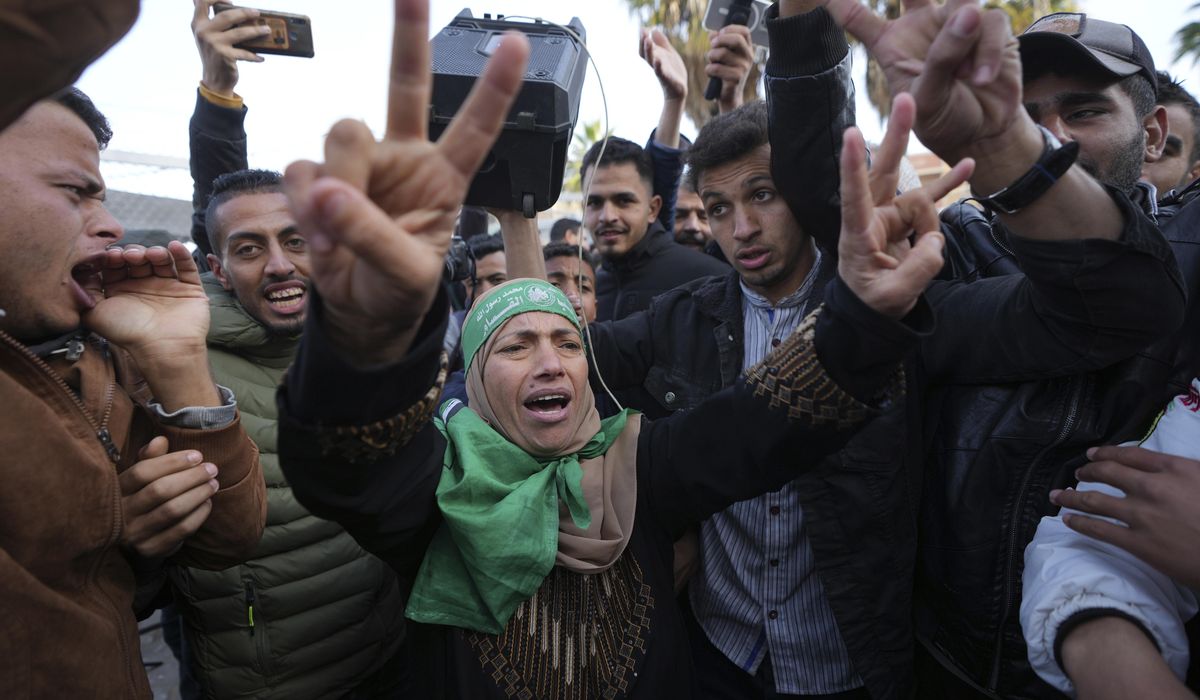


A fragile cease-fire between Israel and Hamas began Sunday, with three hostages held by the Palestinian terrorist group for more than a year released as a first step in what could mark the end of a grueling 15-month war between the two sides.
The Israeli Defense Forces confirmed that the three prisoners — Romi Gonen, 24; Emily Damari, 28; and Doron Steinbrecher, 31 — were released under the terms of the cease-fire deal. The three hostages were transferred by Hamas to the Red Cross, the IDF said in a social media post. They were abducted by Hamas fighters during the group’s Oct. 7, 2023, rampage through Israel.
The first phase of the cease-fire calls for a six-week pause in the fighting between the two sides, during which time Hamas is expected to release another 33 hostages. The group still holds nearly 100 others.
It remains to be seen whether the deal will hold. Its implementation was delayed for several hours early Sunday after Israeli officials said that Hamas militants had not lived up to their end of the goal, partly because they did not provide the names of hostages they intended to release before the agreement went into effect.
Officials in the Gaza Strip, where Israel has been battling Hamas for 15 months, said that another 26 people were killed in Israeli operations during that interim period Sunday. Those figures from the Gazan Health Ministry cannot be independently verified.
The tenuous deal between the two sides comes at a pivotal political moment, both in the Middle East and in the U.S. Mr. Netanyahu faces immense political pressure at home over the deal, with some powerful Israeli figures objecting loudly to the agreement.
In the U.S., President-elect Donald Trump is set to take office Monday. Mr. Netanyahu gave credit to both Mr. Trump’s incoming administration and the outgoing Biden administration, which spent months working feverishly behind the scenes to facilitate a deal to end the fighting in Gaza.
“This agreement is, first of all, the result of the heroism of our fighters in combat, and it is also the result of our steadfast insistence on Israel’s vital interests, in the face of heavy pressure at home and abroad,” Mr. Netanyahu said late Saturday in a televised address.
“This agreement is also the result of cooperation between the outgoing administration of President Biden and the incoming administration of President Trump,” Mr. Netanyahu said. “From the moment he was elected, President Trump has been involved in the mission for the release of our hostages. He spoke with me Wednesday evening. He welcomed the agreement and rightly emphasized that the first stage of the agreement is a temporary cease-fire. That is what he said, ’a temporary cease-fire.’”
“Ahead of the next stages of the agreement, we retain significant assets in order to return all of our hostages, and in order to meet the objectives of the war,” the Israeli prime minister said. “Both President Trump and President Biden have given full backing to Israel’s right to return to the fighting, if Israel reaches the conclusion that the second stage negotiations are ineffectual. I greatly appreciate this.”
Mr. Trump also celebrated the agreement.
“Hostages starting to come out today! Three wonderful young women will be first,” the president-elect posted early Sunday onTruth Social.
The cease-fire deal was announced last week after a year of intensive mediation by the United States, Qatar and Egypt. The first phase is scheduled to last for 42 days. In exchange for the release of hostages, Israeli forces are expected to pull back to a buffer zone in the Gaza Strip, potentially allowing for tens of thousands of displaced Palestinian civilians to return home.
The pause in fighting should also allow for more humanitarian aid to flow into the Gaza Strip, which has been devastated by the near-constant Israeli military operations over the past 15 months.
But it’s unclear what will happen after the first phase. Negotiations on the second phase of this cease-fire should begin in just over two weeks, according to the Associated Press. Fighting between Israel and Hamas could resume if the first phase of the cease-fire expires without a concrete plan to continue the truce.
• This article is based in part on wire service reports.
• Ben Wolfgang can be reached at bwolfgang@washingtontimes.com.
